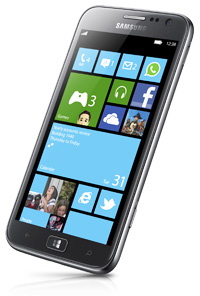Samsung faces Windows dilemma
Overseas carriers shun Windows lineup
Samsung Electronics is facing a bumpy road in a move to reduce its reliance on Google’s Android platform as overseas carriers are shunning promoting the firm’s Windows lineup, according to industry observers.
The technology giant is currently the flagship vendor of the Android platform, giving it huge leverage in talks with carriers over rollout dates or promotions, a power that only Apple enjoys as well.
It recently announced that its Galaxy S line of smartphones that run on Google’s operating system have sold 100 million since their launch in 2010.
Industry analysts said that carriers, such as Spain’s Telefonica and U.S.’s Verizon, are intentionally less enthusiastic about carrying Samsung’s Windows-running Ativ series, even though Windows 8 is a highly competitive platform. It is to prevent the Korean company from gaining too much leverage power by controlling two platforms.
“Mobile operators don’t feel inclined to promote Samsung’s Windows phones and obviously want a diversification of phone vendors,” said HMC Securities analyst Kim Sang-pyo over the phone. “The amount of subsidies offered and product promotions by carriers are lower for Samsung’s Windows lineup compared to Android phones.”
The analyst said that carriers will in the end concede to pressure from Samsung Electronics, as the firm will not sit back and see any of its marketing budget, estimated at 7 trillion won last year, wasted.
“Samsung obviously wants to lessen its dependence on Google’s Android and is considering Windows 8 as one way to maintain its growth amid the saturation of the Android platform in the market,” Kim said. “Windows 8 phones have a great outlook as enterprise phones and can become a good revenue line for Samsung.”
Kiwoom Securities analyst Lee Jae-yoon said the Korean technology firm must react well to the market situation and said it will change by next year, with Windows 8 seen as a third player along with Android and Apple’s iOS.
“After amending some problems such as slow booting time and optimization to run Microsoft Office throughout this year, Windows 8 will sustain its growth and by next year will have a larger share of the market, especially in tablets,” Lee said.
By next year, mobile operators will have to sell Windows 8 phones following market demand with the vendor likely being Samsung. Carriers will have to go along with this, he said.
Analysts generally agree that the tablet lineup featuring Windows 8 is its strong point. “In the domestic market, Samsung’s Windows tablet has sold over 80,000 since launching last year, more than the sales of Google’s Nexus 7,” said Lee. “After Microsoft addresses some of the touch-intensive platform’s shortcomings, it has the potential to become the leader in tablets.”
The world’s largest electronics maker by revenue is likely to pressure partners more into promoting its Windows product line as time goes on.
“People don’t buy Samsung phones because they run on Android but because it is a Samsung phone,” said an industry official requesting anonymity. “Its strong brand image over rivals will guarantee better sales of Windows 8 devices if Samsung sells them.”
Microsoft’s next-generation operating system seems caught up in a tug-of-war between carriers and Samsung gaining more saying-power, the official said.
Nokia recently released its preliminary financial information that indicates its outlook is brightening, which industry analysts estimate to be due to the rising popularity of its low-end Windows phones.
“Nokia’s returning to the black indicates that Windows phones are competitive products that can stand out in the market place,” said Microsoft spokeswoman Lee Sung-yeon. “More and more developers are producing content for our platform and our outlook is positive.” <The Korea Times/Cho Mu-hyun>


























































